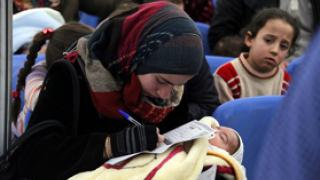
At a meeting in New York, the Executive Committee of the World Federation of United Nations Associations (WFUNA) has expressed its deep concern for the safety and well-being of thousands of refugees from Syria, Afghanistan, Iraq and elsewhere seeking asylum in Europe.
WFUNA represents and coordinates a membership of over 100 national United Nations Associations, including UNA-UK, which also holds a seat on the Executive Committee. The Federation works to strengthen and improve the United Nations through the engagement of global citizens who support international cooperation.
In its statement, the Executive Committee noted that Europe is currently confronting its most serious migration crisis since World War II. Last year, the European Union showed that it could manage the refugee and migration flows effectively and in full respect of international law. Regrettably, only a handful of EU member states opened their doors to refugees, with many EU members refusing to show solidarity and share the responsibility. Thousands of refugees live today in Europe in dire conditions without a clear path to resettlement and in constant fear of deportation.
As Europe eases into summer and shorter sea routes are made ineffectual by the EU-Turkey agreement, more refugees are likely to embark on dangerous journeys across the Mediterranean. So far in 2016, over 180,000 refugees and migrants have already reached Europe by sea. Just short of 800 have died or gone missing attempting the journey, and 500 refugees and migrants died in April as their boat capsized - the worst tragedy at sea this year.
To prevent further deaths and ensure fair treatment of refugees, the Executive Committee of WFUNA echoes calls by the UN Refugee Agency (UNHCR) for the opening of regular pathways for the admission of refugees and asylum-seekers to all European member states, the financing and implementation of resettlement and humanitarian admission programs, more flexible mechanisms for family reunification, labor mobility schemes, and student visas.
The response to the flows of refugees into Europe must include clearly outlined and agreed protection safeguards for all individuals under international and EU law. Ad-hoc agreements, such as the EU-Turkey agreement, do not guarantee effective management of individual cases and contribute to the stigmatisation of refugees in the region.
The Executive Committee calls upon all governments and, in particular, EU member states, to act on the basis of international humanitarian and human rights law and norms. Alongside ensuring safe and swift resettlement of refugees as they flee war, violence and persecution in their own countries, the international community should take all necessary measures to restore peace in their countries of origin.
Photo: A refugee filling an application at the UNHCR registration centre in Tripoli, Lebanon. Credit: Mohamed Azakir / World Bank




